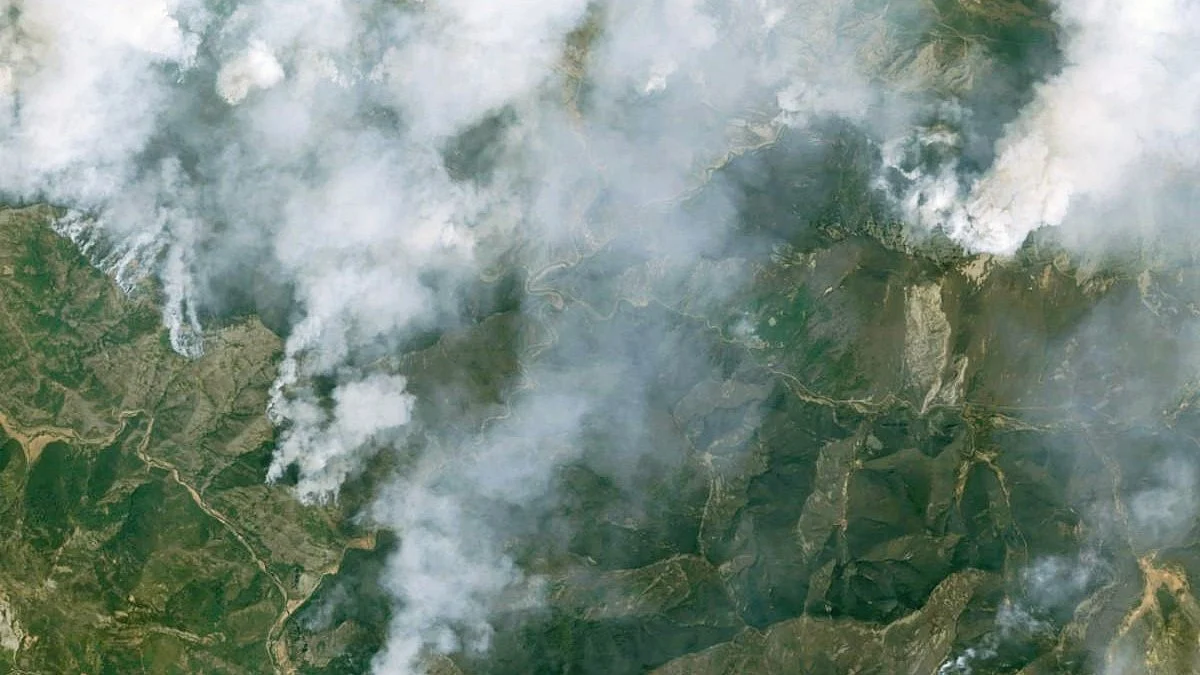Spain’s devastating wildfires highlight rising climate threats across Europe, experts warn
As per European Forest Fire Information System, wildfires have destroyed 403,171 hectares of land in Spain so far in 2025

The wildfires tearing through Spain this summer are a stark reminder of the escalating risks posed by climate change, and a warning that northern and central Europe are unlikely to be spared in the years ahead, a leading Spanish climatologist has cautioned.
“This is a warning to countries that have traditionally enjoyed temperate, cool summers... because these conditions of intense heat will increase in latitude and will reach these countries,” Javier Martin-Vide, climatologist and professor of physical geography at the University of Barcelona, told Xinhua.
Scale of destruction
According to the European Forest Fire Information System, wildfires have destroyed 403,171 hectares of land in Spain so far in 2025. Strikingly, almost 350,000 hectares of that total were lost in just the past fortnight, coinciding with a punishing heatwave that gripped the country from early August.
Authorities say the country is experiencing its most severe wildfire season in more than two decades, with more than 20 large blazes still active, primarily in the north-western provinces of Orense, Zamora and Leon. The interior ministry reported that over 33,000 residents have been forced to evacuate, while at least four people — three of them firefighters — have lost their lives.
Climate models raise alarms
Martin-Vide said climate models point to worsening conditions in the decades ahead, with extreme summer temperatures likely to become far more common across the continent. “Adaptation is key to reducing the risk,” he explained, noting that parts of central and northern Europe – where societies are less accustomed to coping with extreme heat – may in future face summer temperatures above 40°C.
The warnings echo broader scientific consensus across Europe. The European Environment Agency has repeatedly cautioned that climate change is amplifying the frequency and intensity of extreme weather events, including heatwaves, droughts and wildfires. Southern Europe, in particular, has emerged as a climate hotspot, with Spain, Portugal, Italy and Greece recording increasingly destructive fire seasons.
Land management challenges
The Barcelona-based academic highlighted how demographic shifts have compounded the fire threat in Spain. Rural depopulation, he argued, has left landscapes more vulnerable to rapid fire spread. “The woods are not as clean as in the past, when there were cattle, sheep, goats grazing and eating the vegetation that now acts as the fuel that starts a forest fire,” Martin-Vide observed.
He recommended innovative strategies such as creating “mosaic landscapes” – a patchwork of forest interspersed with cultivated fields – to slow the advance of flames and create natural firebreaks.
Adaptation in agriculture
Martin-Vide also pointed to changes already visible in Spanish agriculture. Olive growers and winemakers, faced with hotter and drier conditions, are moving production to higher altitudes where cooler temperatures provide more favourable conditions. These shifts, while helping preserve production levels and quality, underscore the profound impact climate change is having on traditional crops and rural economies.
National and EU response
The Spanish government has pledged to establish a nationwide pact on fire prevention, which Martin-Vide described as “very necessary.” Authorities are investing in early detection systems, firefighting capacity and coordinated emergency responses, but experts stress that prevention through land use management will be just as crucial as crisis response.
At the European level, the crisis is also influencing climate policy. The European Union has been expanding its rescEU programme, which pools firefighting aircraft and equipment that member states can deploy rapidly to hotspots across the bloc. Brussels has also emphasised the importance of implementing the European Green Deal, aiming to reduce greenhouse gas emissions by 55 per cent by 2030, while highlighting adaptation strategies for sectors such as forestry and agriculture.
Earlier this summer, the European Commission released new guidance urging member states to strengthen national fire prevention strategies and ensure better coordination of resources. Officials say the escalating wildfire seasons demonstrate the need to balance emissions reduction with robust adaptation, particularly in vulnerable southern regions.
A European warning
Spain’s current wildfire crisis follows similar experiences in Greece and Italy this summer, where prolonged heatwaves triggered multiple large-scale fires. Scientists warn that as the Mediterranean continues to heat faster than the global average, the risks will increasingly extend northwards into countries that historically have not had to deal with fire on such a scale.
“Spain is on the front line today, but the lessons are for all of Europe,” Martin-Vide said, urging governments to take the threat seriously.
With IANS inputs
Follow us on: Facebook, Twitter, Google News, Instagram
Join our official telegram channel (@nationalherald) and stay updated with the latest headlines
